 BP has delayed a key test on a newly installed well cap aimed at stopping the flow of oil in the Gulf of Mexico.
BP has delayed a key test on a newly installed well cap aimed at stopping the flow of oil in the Gulf of Mexico.
BP and US Coast Guard officials said further analysis was needed before pressure testing could begin.
If it proves successful, the well will be kept "shut in" and the leak halted until relief wells plug it entirely.
The blown-out well has been spewing oil into Gulf waters since April. The US administration has sent BP and other parties a new bill for the clean-up.
The administration says the latest bill is for $99.7m (£65.8m).
The oil giant has already fully paid the last three bills totalling $122.2m (£80.6m) for costs related to response and clean-up of the spill, according to the Obama administration.
'No promises'
The test in the Gulf of Mexico, which was supposed to begin on Tuesday, will determine whether BP's new cap can contain the oil.
Coast Guard chief Admiral Thad Allen said the extra analysis would continue into Wednesday.
This latest move to stop the oil comes a day after the containment cap was placed on the leaking well.
Work on the permanent relief well solution continues.
BP Vice-President Kent Wells said no promises could be made about whether the new cap would work.
"It's not simple stuff. What we don't want to do is speculate around it," he said.
Shutting in the well would provide a temporary solution to the leaking oil. BP is continuing work on the relief well that is expected permanently to stop the oil.
If the test goes as planned, it will mark the first time since the explosion aboard the Deepwater Horizon drilling rig on 20 April that the leaking oil has been stopped.
During the tests, BP will be monitoring the pressure of the oil in the well.
High pressure will mean the oil has been contained inside the wellhead.
But if the tests showed there was low pressure, Mr Wells said, this might indicate that oil was leaking elsewhere in the well.
He added that if pressure was low the cap would not be kept shut and ships on the surface of the Gulf would continue collecting oil.



